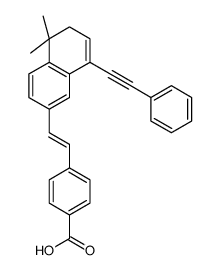BMS 493

BMS 493 structure
|
Common Name | BMS 493 | ||
|---|---|---|---|---|
| CAS Number | 215030-90-3 | Molecular Weight | 404.50000 | |
| Density | N/A | Boiling Point | N/A | |
| Molecular Formula | C29H24O2 | Melting Point | N/A | |
| MSDS | Chinese USA | Flash Point | N/A | |
|
Trichostatin A reduces GnRH mRNA expression with a concomitant increase in retinaldehyde dehydrogenase in GnRH-producing neurons.
Mol. Cell. Endocrinol. 413 , 113-9, (2015) Trichostatin A (TSA) is a selective inhibitor of mammalian histone deacetylase and is widely used to modify the ability of DNA transcription factors to bind DNA within chromatin by interfering with histone deacetylation. In the GnRH-producing neuronal cell li... |
|
|
Retinoic acid signalling regulates the development of tonotopically patterned hair cells in the chicken cochlea.
Nat. Commun. 5 , 3840, (2014) Precise frequency discrimination is a hallmark of auditory function in birds and mammals and is required for distinguishing similar sounding words, like 'bat,' 'cat' and 'hat.' In the cochlea, tuning and spectral separation result from longitudinal difference... |
|
|
Retinoic acid receptor alpha is associated with tamoxifen resistance in breast cancer.
Nat. Commun. 4 , 2175, (2013) About one-third of oestrogen receptor alpha-positive breast cancer patients treated with tamoxifen relapse. Here we identify the nuclear receptor retinoic acid receptor alpha as a marker of tamoxifen resistance. Using quantitative mass spectrometry-based prot... |
|
|
Retinoic acid regulates embryonic development of mammalian submandibular salivary glands.
Dev. Biol. 407 , 57-67, (2015) Organogenesis is orchestrated by cell and tissue interactions mediated by molecular signals. Identification of relevant signals, and the tissues that generate and receive them, are important goals of developmental research. Here, we demonstrate that Retinoic ... |
|
|
Activation of Akt pathway by transcription-independent mechanisms of retinoic acid promotes survival and invasion in lung cancer cells.
Mol. Cancer 12 , 44, (2013) All-trans retinoic acid (ATRA) is currently being used in clinical trials for cancer treatment. The use of ATRA is limited because some cancers, such as lung cancer, show resistance to treatment. However, little is known about the molecular mechanisms that re... |